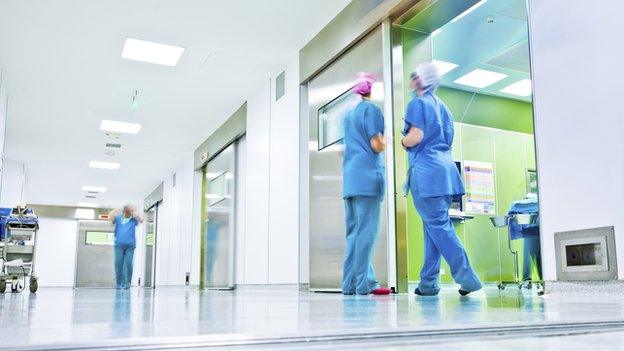Making the sums add up
- Published

What will happen if the NHS gets the money it wants?
Its called the "Green Budget", but it has nothing to do with environmental policy.
Instead it is the The document is the annual assessment of UK public spending and the economy - produced by the Institute for Fiscal Studies ahead of the forthcoming Budget - which sets out the issues and potential options for the government .
The 2015 edition, just published, has a lengthy chapter on health spending, another sign of how the financing of the NHS has risen high on policymakers' agenda.
Number-crunching by the IFS is widely regarded as authoritative and rigorous.
Its commentary is acknowledged across Westminster as independent and scrupulously fair.
At a time when a fiercely partisan political debate is raging around the NHS, what the IFS has to say about health spending is especially valuable.
The IFS looks through the same crystal ball as Simon Stevens and his colleagues at NHS England, casting forward to how the NHS might look at the end of the next parliament in the financial year 2020/21.
The premise is that the health service in England will have a funding gap of around 拢30 billion in that year - that's the difference between anticipated demand for care and an NHS budget which rises in line with inflation but no more.
Mr Stevens has said that more than two thirds of the gap can be closed by efficiency savings and productivity improvements but 拢8 billion above inflation will still have to be found in that year by whoever is in government.
'Herculean' performance
To achieve the Stevens plan, the IFS says productivity gains of 2.4% per year will be needed over the next five years and a real terms annual health funding increase of 0.8%.
But that rate of spending growth would need other departments to slash budgets by more than 6% per year over the same period, assuming that the government sticks to plans set out by the coalition (though Labour and Liberal Democrat plans would be different).
To put that in perspective, the Department of Health budget is set to increase by an average 1.2% per year between 2010/11 and 2015/16 with other departments seeing real cuts of 3.3% per year over the same period.
The IFS raises the idea of charging for all prescriptions
In plain terms, the IFS is suggesting that the Stevens plan requires a herculean performance on NHS efficiency savings and annual budget cuts for the rest of Whitehall which would be nearly twice as deep as during this parliament.
What's more, the IFS says the implied health spending increase of 0.8% per year will not be enough to keep pace with higher demand for care caused by the growing and ageing population.
So what are we to conclude from these stats and analysis?
In its usual polite and considered tones, the IFS says "there are therefore no easy choices for whoever forms the next government - difficult decisions will need to be made".
Public funding 'unusual'
The IFS raises the idea of increasing existing charges, such as prescriptions, or introducing new charges on some NHS services.
It notes that the UK is "unusual" in having such a big chunk of health spending funded from public sources.
But it notes tactfully that such policies are not being proposed by any of the main political parties.
Reading between the lines of a typically understated document, the conclusion from this leading source of expertise on the public finances is clear.
However reasonable the Simon Stevens five year plan for the NHS in England may be, delivering it will require a superhuman effort by staff, management and other departments as well as the politicians in power.
- Published27 January 2015
- Published26 January 2015